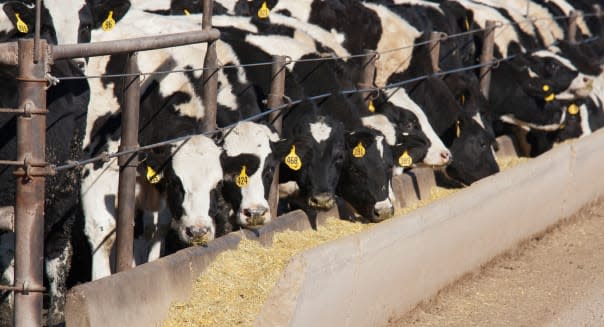'Healthy' Cows, Sick Consumers: CDC Warns of a High Cost in Cheap Meat

On the surface, it's hard to question the cost-effectiveness of factory-farmed meat. After all, the math is pretty simple: You start with inexpensive animals, raise them at relatively minimal cost, butcher them in the cheapest way possible, and sell them for low, low prices.
But the math gets a little more complicated when you look at the long-term health impact of all that cheap meat. Of course, there are the obvious things that everyone's already worried about -- issues like cholesterol and high blood pressure and gout and whatnot -- but the biggest downside comes from something that you probably haven't considered: antibiotic-resistant bacteria.
In a recent report, the Centers for Disease Control estimated that 2 million Americans are hit with antibiotic-resistant infections every year -- and 23,000 people die from them.
Doctor Feelgood
So what causes all these outbreaks? In part, it's our overreliance on antibiotics. Every time your doctor prescribes antibiotics to you, the bacteria in your body grow more able to tolerate them. Those antibiotic-resistant germs can then get passed on to other people, leading to the spread of harder-to-kill infections, which leads to more doctor visits, and so on, in a vicious cycle.
So, obviously, the first solution to our antibiotic-resistant bug problem is to stop overprescribing antibiotics. We should, many health experts argue, save the antibiotics for the times when we really need them.
This Little Piggie Had Penicillin ...
But our overuse of erythromycin and amoxicillin is just a small part of the problem. Even if you never fill your antibiotic prescriptions -- even if your doctor never writes them -- chances are that you're still consuming a huge amount of antibiotics in your food. More specifically, in your meat.
When factory farms look for ways to cut costs, space is one of the first things to go: Factory owners often crowd animals together in cramped pens. But when cows, pigs and chickens live in such cramped conditions, often with open wounds and amid ever-growing piles of feces, the barns become a breeding ground for bacterial infections. One way to cut back on this is to give the animals more space. Another way is to pump them full of antibiotics.
Not surprisingly, most factory farm operations go for the latter. In fact, the meat industry currently uses 80 percent of all antibiotics that are consumed in the US. All those drugs keep the animals relatively disease-free -- and help keep meat cheap. But it's not exactly an impressive price cut for the customer: According to one estimate, the use of antibiotics on farms saves the average meat-eating consumer $5 to $10 a year.
%VIRTUAL-article-sponsoredlinks%And those minor savings may come at a huge cost. Sloppy slaughtering methods often contaminate meat with antibiotic-resistant bacteria from the animals' colons and stomachs. And, even if factory-farmed meat makes it to your grocery store without becoming contaminated, there are other ways animal waste enters the food cycle: Water and manure that are left over from factory animals often get used on crops, further spreading antibiotic-resistant bacteria.
So What Can You Do?
As I've pointed out in the past, there are a few ways to protect yourself. To begin with, you can ensure that your meat is cooked to an internal temperature of 160 degrees F -- both at your home, and in any restaurants that you visit. Unfortunately, while this will kill any bacteria hiding inside your burger, it will also transform it into a well-done hockey puck.
Maybe you should just stick to the brisket.
You can also try looking for organic meat. While a little more expensive, it is produced without antibiotics, which lowers your chance of encountering antibiotic-resistant bacteria. For that matter, you may want to think about using organic vegetables -- or, at least, carefully washing your fresh produce.
Another option is to get involved. Last week, I wrote about new USDA procedures would cut inspections on chicken and pork, and would allow Chinese poultry to be sold in American markets. Since these plans also reduce the number of USDA inspectors -- among the few barriers between you and food poisoning -- they could directly affect your health. If you get a chance, you may want to tell your congressman or senator that you've got some problems with this.
Given the huge lobbying efforts behind the USDA's inspector cuts and opening the U.S. to Chinese chicken imports, chances are that both policy changes will happen. Even if they don't, however, it never hurts to be safer with your food.
Bruce Watson is DailyFinance's Savings Editor. You can reach him by e-mail at bruce.watson@teamaol.com, or follow him on Twitter at @bruce1971.

